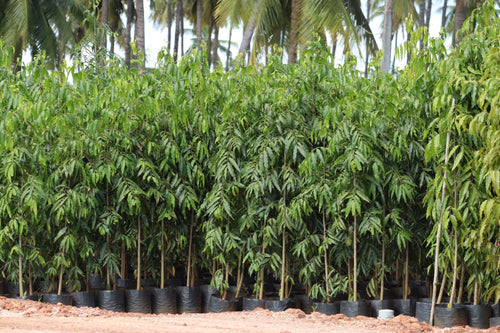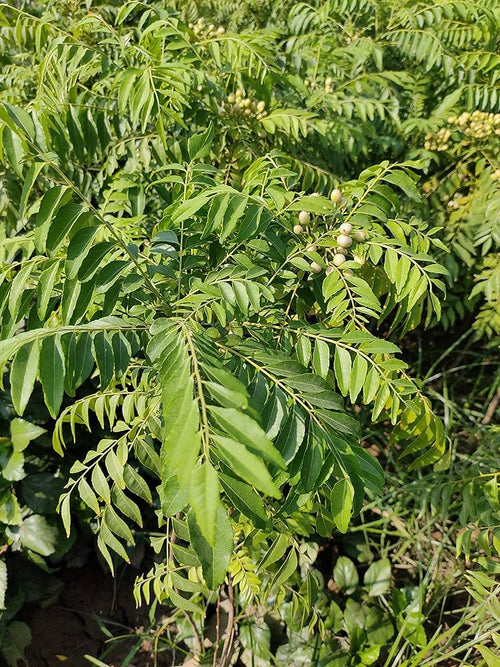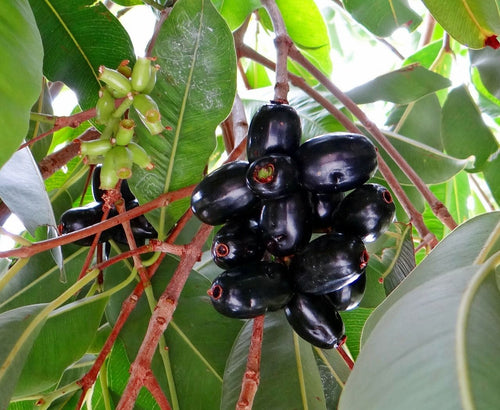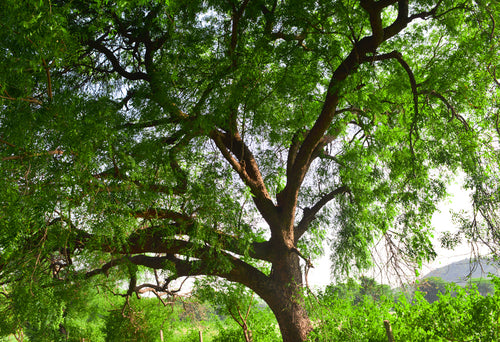Polymart Plants the Future: Engaging Employees Through Agroforestry
PolyMart, India’s fastest-growing polymer distribution platform, is embracing sustainability with an innovative agroforestry-based tree plantation ini Read more
Project Update 2
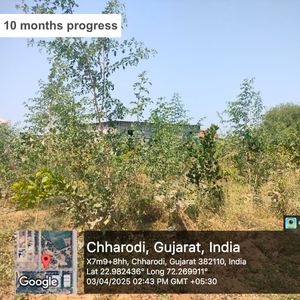
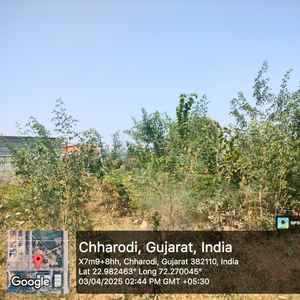
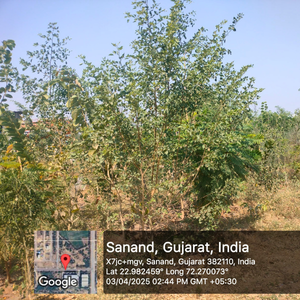
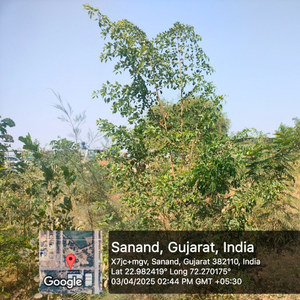
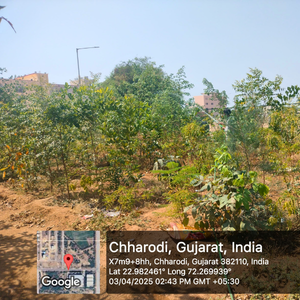
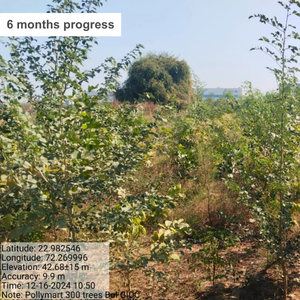
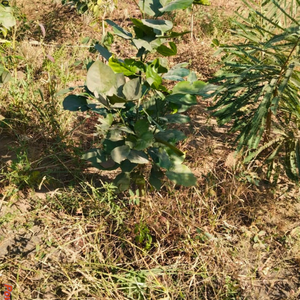
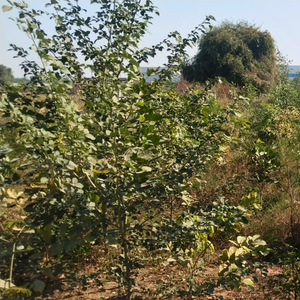
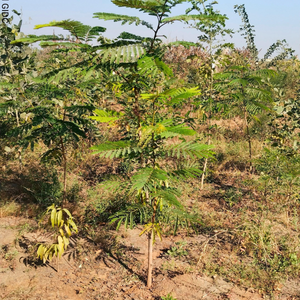
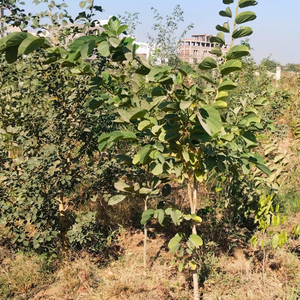
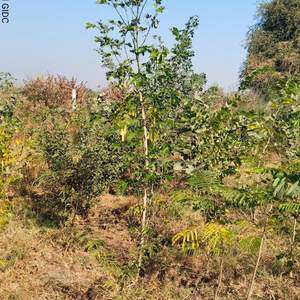
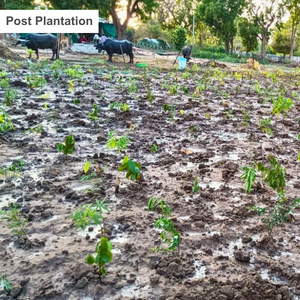
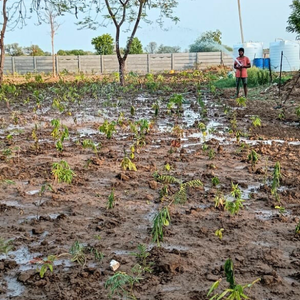
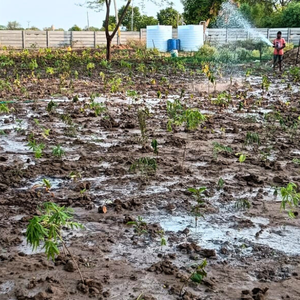
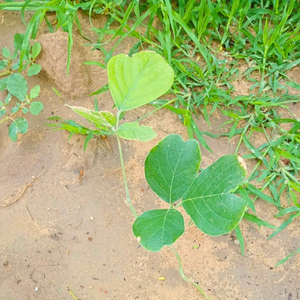
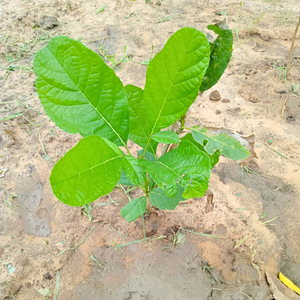
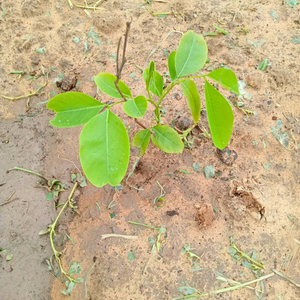
Project Update 1
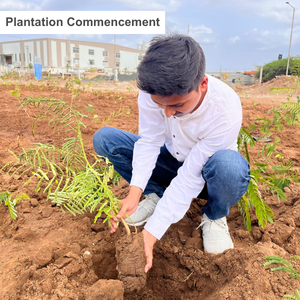
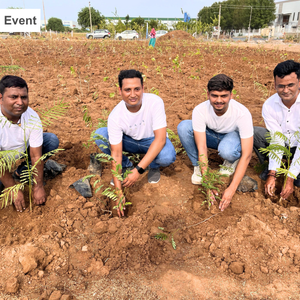
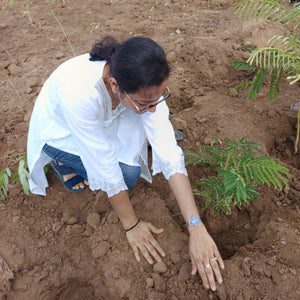
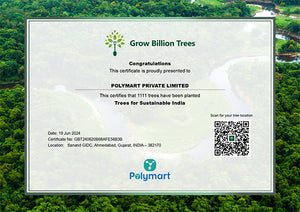
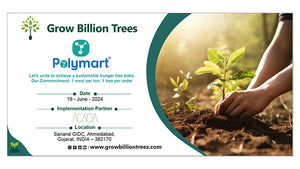
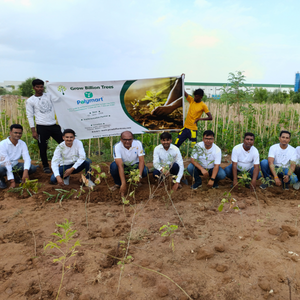

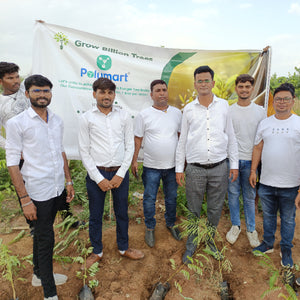
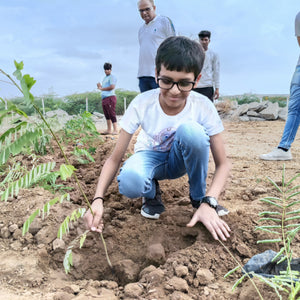

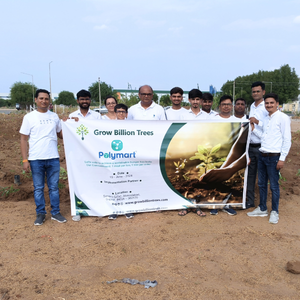
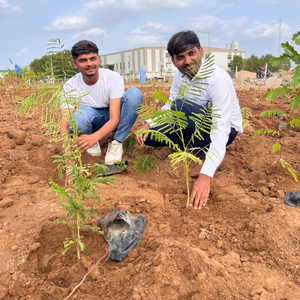
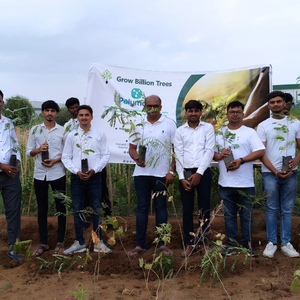
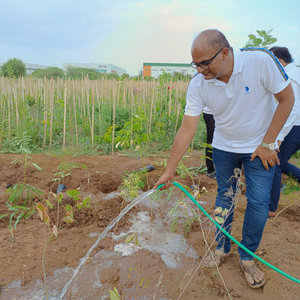
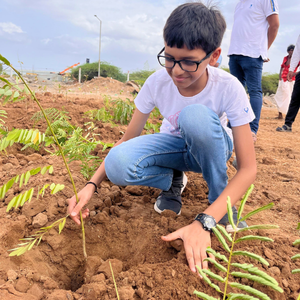
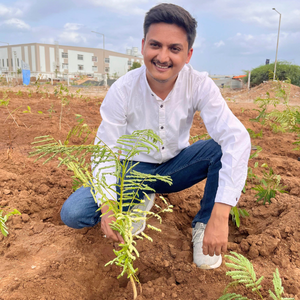
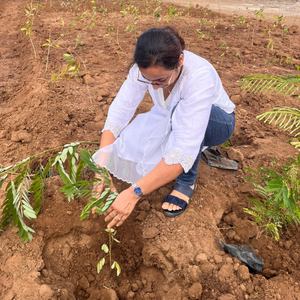
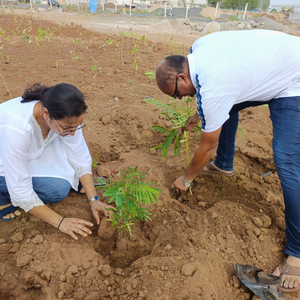
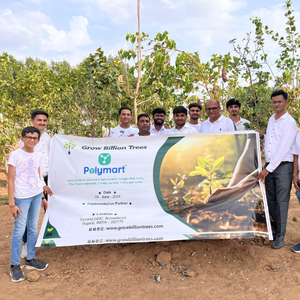
Digital Forest
Forest with 300 Trees planned
Want to plant your tree now?
Plant a Tree @ 299Polymart Plants the Future: Engaging Employees Through Urban Forestry
PolyMart, India’s fastest-growing polymer distribution platform, is embracing sustainability with an innovative agroforestry-based tree plantation initiative, designed to engage employees while giving back to nature. Recognizing the role of the environment in shaping a sustainable future, Polymart is taking strides to foster green growth by involving its team in hands-on tree planting experiences.
This agroforestry project aims to integrate trees into agricultural landscapes, enhancing biodiversity, promoting soil health, and improving air quality. By allowing employees to plant and care for saplings in a productive ecosystem, Polymart not only strengthens its environmental stewardship but also builds a culture of teamwork and responsibility. This initiative reflects Polymart's commitment to transforming not only the polymer industry but also the environment through actionable change and active employee participation. Together, Polymart and its team are cultivating a greener, more sustainable future.
This initiative reflects Polymart’s ongoing commitment to environmental stewardship and sustainable development. By embedding social and environmental responsibility into its core operations, Polymart continues to lead by example, demonstrating that commercial growth and sustainability can go hand in hand. As part of its broader mission, Polymart advances an impactful initiative - Let’s unite to achieve a sustainable, hunger-free India“1 meal per ton, 1 tree per order,” reinforcing its dedication to addressing both environmental sustainability and food security.
Project Planning & Execution
No of Trees: 300 trees
Plantation Location: Sanand GIDC, Ahmedabad, Gujarat – 382170
Plantation Date: 19th June 2024
Name of Species: Keshiya Sayma, Shisham, Imali, Avala, Anjan, Rain Tree, Gulmohar, Belpatra, Chirol, Neem, Jamun, Amaltash, Ashok, Peltaform, Saja, Karanj, Duudhi, Tecoma, Pilkhan, and Arjun
Species Selection & Its Benefits:
Polymart’s tree plantation initiative carefully selected species suited to the local climate and urban environment, ensuring ecological resilience and long-term sustainability. The chosen mix supports biodiversity, improves air quality, aids water management, and enhances the overall urban landscape.
A total of 20 species were planted, including native, medicinal, shade-giving, and flowering trees such as Keshiya Sayma, Shisham, Imali, Avala, Anjan, Rain Tree, Gulmohar, Belpatra, Chirol, Neem, Jamun, Amaltash, Ashok, Peltaform, Saja, Karanj, Duudhi, Tecoma, Pilkhan, and Arjun. This diverse selection fosters habitat creation for local wildlife and strengthens the ecosystem’s resilience to climate challenges.
Medicinal and culturally significant trees like Neem, Belpatra, Arjun, Ashok, and Imali provide traditional healing benefits and continue to play vital roles in community health and wellness. Flowering and shade trees such as Gulmohar, Amaltash, Rain Tree, and Tecoma enhance urban aesthetics while contributing to temperature regulation and improved air quality.
Native species, including Shisham, Pilkhan, Saja, and Karanj, are instrumental in soil enrichment, water retention, and supporting pollinators. Additionally, species like Keshiya Sayma and Anjan help stabilise the soil and promote biodiversity.
Together, this thoughtfully chosen variety ensures lasting environmental benefits, improves urban livelihoods, and promotes a greener, healthier cityscape.
Beneficiaries Details
-
Target Population: Employees, stakeholders, and local community members of Sanand GIDC, Ahmedabad, Gujarat
-
Age Group: All age groups focus on adults to seniors
-
Gender: Inclusive of all genders
- Social & Economic Status: Open to all social and economic backgrounds, emphasizing community involvement
Planting Methodology and Its Advantages
Urban Forestry: An urban forest is a network of trees, shrubs, and vegetation strategically planted in urban areas to enhance biodiversity, improve air quality, reduce the urban heat island effect, and provide green spaces for community well-being. It helps mitigate climate change by absorbing carbon dioxide, promotes mental health through accessible green areas, and supports local wildlife by creating habitats. Urban forests play a vital role in building resilient, sustainable cities that benefit both the environment and the people who live in them. These plantations are essential in offsetting the negative impacts of rapid urbanisation by creating cooler, cleaner, and more sustainable urban environments. With limited space in cities, thoughtful species selection, soil preparation, and ongoing maintenance are crucial for the long-term success of urban plantations.
Advantages of Urban Forestry
-
Climate Regulation and Cooling Effect: Urban forests help mitigate the urban heat island effect by providing shade and cooling through transpiration, lowering temperatures in cities, reducing the need for air conditioning, and conserving energy.
-
Improved Air Quality: Trees absorb pollutants like carbon dioxide, nitrogen oxides, and particulate matter, leading to improved air quality and reducing the risk of respiratory illnesses in urban areas.
-
Stormwater Management and Flood Prevention: Urban forests improve the soil’s ability to absorb and retain water, reducing stormwater runoff, preventing flooding, and promoting groundwater recharge, thus helping manage water resources efficiently.
-
Soil Erosion Control: The deep root systems of trees prevent soil erosion, especially in areas with heavy rainfall or steep slopes, stabilizing the land and reducing soil loss in urban environments.
-
Aesthetic and Recreational Value: The transformation of unused spaces into green zones adds aesthetic value to the area and provides employees and local communities with recreational spaces, making the workplace more enjoyable.
-
Enhanced Community Engagement and Well-being: Urban forests provide accessible green spaces where communities can engage in recreational activities, improving mental health, reducing stress, and fostering a sense of environmental stewardship among residents and employees.
-
Increased Property Value: Properties located near urban forests or green spaces tend to have higher market values, benefiting local property owners and increasing the overall appeal and livability of the area.
-
Noise Reduction: Urban forests act as natural sound barriers, reducing noise pollution and creating quieter, more peaceful surroundings.
Activities During Tree Plantation
The tree plantation drive organised by Polymart on 19th June 2024 at Sanand GIDC, Ahmedabad, saw active and spirited participation from employees, highlighting their shared commitment to sustainability and environmental stewardship. The event demonstrated how corporate responsibility can translate into meaningful on-ground action.
Preparations for the day included site layout planning, pre-dug pits, and the careful arrangement of saplings selected for their ecological benefits. A prominent banner displayed Polymart’s inspiring pledge: “Let’s unite to achieve a sustainable, hunger-free India – Our Commitment: 1 meal per ton, 1 tree per order.” This message served as a powerful reminder of the company’s dual focus on environmental and social impact.
Employees actively engaged in planting activities, learning about the importance of each species in enhancing biodiversity, improving air quality, and supporting climate resilience. The initiative provided a hands-on opportunity to reconnect with nature and promote eco-conscious values within the organisation.
The event concluded with team bonding moments and group photographs, capturing the spirit of unity and purpose. Beyond the trees planted, the day left behind a lasting impression of hope, action, and collective commitment to a greener tomorrow.
Conclusion Elements
Impact
Direct Impact
|
Parameters |
Values |
References |
|
No. of Trees Planted |
300 |
|
|
Green Cover (Acres) |
0.2 acres |
|
|
Carbon Sequestration Potential (KG) |
20 |
Small to medium-sized trees can sequester around 10–48 kilograms (22–106 pounds) of CO₂ annually. https://onetreeplanted.org/blogs/stories/how-much-co2-does-tree-absorb |
|
Carbon Sequestration by 300 mature trees ( Tons/year) |
6 Tons |
No. of Trees x Carbon Sequestration by 1 mature trees per year |
|
Carbon Credit Equivalent |
6 |
One carbon credit is equivalent to one tonne of carbon dioxide or the equivalent amount of another greenhouse gas. |
|
Carbon Footprint of an avg Indian Citizen (Tons/Year) |
1.8 |
|
|
Offsets Annual Carbon Footprint of (Adults) |
3 |
Carbon offset by 300 mature trees per year / Carbon Footprint of an avg Indian Citizen per year |
* This impact analysis is forward-looking (An urban-forest project matures in 3-5 years)
Indirect Impact
Community Impact
-
Improved Public Health: By improving air quality and reducing urban heat, the project indirectly contributes to better public health. The presence of green spaces encourages outdoor activities, which can reduce stress levels, promote mental well-being, and decrease the incidence of respiratory diseases.
-
Environmental Awareness: Involving communities in urban forestry raises awareness about environmental conservation and promotes sustainable practices in daily life.
-
Employee Morale: The initiative fostered a sense of pride and connection among employees, strengthening team bonds and their alignment with the company’s values.
-
Inspiration for Change: By showcasing the potential of urban forestry, the project has encouraged other organisations and local communities to undertake similar initiatives.
-
Cultural Shift: The initiative instilled a mindset of sustainability and environmental care among participants, creating advocates for green practices in their personal and professional lives.
Environmental Impact
-
Carbon Sequestration: The trees planted through Polymart's urban forestry initiative absorb carbon dioxide, acting as carbon sinks and helping mitigate climate change by reducing greenhouse gas emissions.
-
Soil Health Improvement: The tree planting initiative enhances soil health by enriching it with organic matter, improving soil fertility and structure, which supports the growth of surrounding vegetation.
-
Erosion Prevention: Tree roots help stabilise the soil in urban areas, preventing erosion caused by wind and water, while safeguarding nearby properties and infrastructure from potential damage.
-
Biodiversity Conservation: By creating green spaces, the initiative supports local biodiversity, providing habitats for various species, pollinators, and beneficial insects, and enhancing the ecological balance in urban areas.
-
Water Cycle Regulation: The urban forestry project helps regulate the water cycle by improving water retention in the soil, recharging groundwater levels, and reducing surface runoff, leading to a more balanced and sustainable urban environment.
-
Microclimate Regulation: Trees planted through this initiative moderate temperature extremes, reduce wind speeds, and increase humidity, creating a favourable microclimate for both the community and the urban ecosystem.
Achievements
SDG Goals Achieved through Urban Forestry
-
SDG 3: Good Health and Well-Being: Polymart’s urban forestry initiative improves air quality and introduces green spaces that support physical and mental well-being. These natural environments help reduce stress, encourage outdoor activity, and foster healthier lifestyles in urban settings.
-
SDG 6: Clean Water and Sanitation: Through tree planting, Polymart promotes water conservation by aiding groundwater recharge, reducing runoff, and enhancing soil moisture retention, contributing to sustainable urban water systems.
-
SDG 7: Affordable and Clean Energy: By reducing the urban heat island effect, the plantation helps moderate city temperatures and decrease dependence on energy-intensive cooling systems, thus promoting energy efficiency and sustainability.
-
SDG 8: Decent Work and Economic Growth: The initiative creates green jobs in nursery management, plantation, and ecosystem maintenance, supporting local livelihoods and advancing the green economy.
-
SDG 9: Industry, Innovation, and Infrastructure: Polymart incorporates sustainable green practices into urban infrastructure, showcasing innovative approaches that integrate technology with environmental resilience.
-
SDG 10: Reduced Inequalities: The initiative is inclusive, involving employees from all backgrounds in environmental action. By developing accessible green zones, Polymart ensures shared environmental and health benefits across communities.
-
SDG 11: Sustainable Cities and Communities: By increasing green cover and enhancing biodiversity in dense urban areas, Polymart contributes to building sustainable, resilient, and livable cities.
-
SDG 12: Responsible Consumption and Production: Polymart’s eco-initiatives reflect a commitment to sustainable practices, emphasising efficient use of resources and long-term ecological responsibility.
-
SDG 13: Climate Action: The planted trees help sequester carbon dioxide, reduce emissions, and buffer against climate change impacts, actively supporting global climate goals.
-
SDG 15: Life on Land: By restoring green spaces with native and fruit-bearing trees, the initiative strengthens biodiversity, supports wildlife, and contributes to a thriving urban ecosystem.
-
SDG 16: Peace, Justice, and Strong Institutions: By fostering inclusive decision-making and community-led governance, Polymart strengthens local environmental stewardship, ensuring transparency and collaboration for sustainable urban development.
-
SDG 17: Partnerships for the Goals: The initiative thrives on collaboration with local communities, environmental organisations, and partners such as Grow Billion Trees. Polymart strengthens environmental partnerships to drive impactful urban sustainability and afforestation efforts. future.
ESG Achieved through Urban Forestry
-
Environmental Impact: Polymart’s urban forestry initiative makes a meaningful contribution to environmental sustainability. By planting a diverse mix of native and beneficial tree species, the company enhances local biodiversity, supports pollinators and wildlife, and strengthens urban ecosystems. These trees act as natural carbon sinks, helping to reduce atmospheric CO₂ levels and combat climate change. Additionally, the plantation improves climate resilience by regulating ambient temperatures, reducing the urban heat island effect, improving air quality, and increasing groundwater recharge. This forward-looking effort supports long-term ecological balance and a healthier environment for future generations.
-
Social Impact: Polymart’s urban forestry initiative fosters social responsibility and community well-being by involving employees and local stakeholders in environmental stewardship. Through active participation in tree planting and awareness efforts, the initiative cultivates a deeper connection with nature and promotes collective action for sustainability. The creation of green spaces improves air quality, encourages outdoor activity, and contributes to better mental and physical health. Additionally, the project supports green jobs through sapling plantation and ongoing maintenance, while promoting inclusivity by ensuring access to cleaner, greener environments for all communities, including underserved groups. This initiative helps build a more resilient, equitable, and environmentally conscious society.
-
Governance Impact: Polymart showcases strong environmental leadership and responsible governance through its urban forestry initiative. By integrating sustainability into its core CSR strategy, the company promotes transparency and accountability in project planning, execution, and reporting. Collaborating with environmental organisations and local communities, Polymart ensures that its afforestation efforts are inclusive, impactful, and aligned with broader ecological goals. This governance approach not only supports environmental and social outcomes but also reflects the company’s long-term vision for sustainable growth and ethical corporate responsibility.
Building Communities
One of the most impactful outcomes of Polymart’s urban forestry initiative was the sense of unity and collaboration it cultivated. By involving employees, local communities, and volunteers, the project became a collective mission to create sustainable urban green spaces, fostering a shared commitment to a greener future.
-
Empowering Communities: Participants became active contributors, gaining knowledge about urban forestry practices and taking ownership of the initiative. This empowerment strengthened their connection to the environment and reinforced their role as environmental stewards.
-
Fostering Partnerships: The project brought together diverse stakeholders, including Polymart, Grow Billion Trees, and local communities, highlighting the value of collaboration in achieving environmental and social goals.
-
Creating a Ripple Effect: As communities experienced the benefits of urban forestry, their enthusiasm inspired others to adopt similar practices, amplifying the initiative's positive impact across the region.
This initiative demonstrates that environmental sustainability thrives when rooted in collective effort. It’s not just about planting trees—it’s about planting hope, collaboration, and a shared vision for a healthier and greener future.
Commitment by Grow Billion Trees
-
Ensuring Tree Survivability: GBT prioritises native species, continuous monitoring, and soil health improvement using organic fertilisers. These efforts ensure sustainable growth and benefit communities.
-
Transparency & Accountability: GBT provides detailed reports on tree growth, survival rates, and carbon benefits, using geo-fencing and regular updates to maintain transparency and effectiveness.
-
Sustainable Plantation Efforts: GBT implements projects that balance environmental, social, and economic goals, addressing issues like urban heat islands and degraded farmlands. These efforts promote ecological balance, livelihoods, and long-term climate resilience.
-
Enhancing Ecosystem Health: By selecting native species and creating diverse habitats, GBT enhances biodiversity and ecosystem resilience, ensuring long-term ecological health and supporting wildlife.
-
Long-Term Impact: GBT’s initiatives tackle environmental challenges, foster climate resilience, and promote sustainable development while reducing carbon footprints.
Acknowledgment
We at Grow Billion Trees extend our heartfelt gratitude to everyone who contributed to the success of the urban forestry initiative at Sanand GIDC, Ahmedabad, Gujarat. This initiative exemplifies the power of collective action in addressing urban environmental challenges and would not have been possible without the support of dedicated employees, local partners, and community stakeholders. Together, we have taken a meaningful step towards restoring green cover and enhancing ecological balance.
To Polymart: We sincerely thank you for your unwavering commitment to sustainability and your vision of building a greener, hunger-free India. Your impactful pledge—“1 meal per ton, 1 tree per order”—beautifully reflects your integrated approach to addressing both environmental and social needs. Your support for the plantation of 300 trees at Sanand GIDC is a valuable contribution toward improving biodiversity, reducing pollution, and enhancing the urban ecosystem. The enthusiastic involvement of your team highlights a strong culture of environmental responsibility and purpose-driven engagement.
To Our Ground Partners and Volunteers: Your dedication and on-ground expertise played a vital role in executing this initiative with precision and care. Your efforts ensured that each tree was thoughtfully selected and planted to maximise ecological benefits and community value. Your collaboration continues to drive real change in creating sustainable, healthy, and biodiverse urban environments.
Thank you all for your continued support and commitment to growing a better, greener future—one tree at a time.
Closing Remarks
We are proud to have partnered with Polymart in their remarkable journey towards environmental sustainability through their urban forestry initiative in Sanand GIDC, Ahmedabad. This project has brought meaningful green cover to an expanding industrial area, contributing to ecological resilience, improved air quality, and a healthier urban environment.
Polymart’s commitment to sustainability, reflected in their unique pledge, “1 meal per ton, 1 tree per order,” is a powerful example of how businesses can integrate environmental and social responsibility into their core mission. This initiative not only enriched the local ecosystem with 300 thoughtfully selected trees but also strengthened community engagement and environmental awareness.
As we look to the future, we are committed to scaling such transformative projects and inspiring more organisations to take proactive steps toward sustainability. Every sapling planted is a promise of cleaner air, richer biodiversity, and a more balanced environment.
A heartfelt thank you to the entire Polymart team, our ground partners, and everyone who contributed to making this initiative a success. Together, let us continue to build greener cities and a more sustainable world—one tree at a time.
Trees for Corporates
Trending
Most Popular
1. Tree Plantation for Employee Engagement
employees get a break from the office grind, a chance to contribute to something meaningful, and, of course, the satisfaction of knowing that their hard work will help fight climate change. It’s teamwork with roots!
2. Sustainable Agroforestry Practices
take a pinch of trees, mix in some crops, and voilà! Polymart’s agroforest initiative blends these elements to create a more sustainable environment while reaping economic rewards. Through sustainable agroforestry, the company helps restore soil health, conserve water, and support local biodiversity. It’s not just about planting trees; it’s about creating a productive ecosystem where agriculture and forestry thrive side by side. Plus, it’s a natural way to fight climate change. Who knew saving the planet could be so easy (and green)?
3. Corporate Social Responsibility (CSR) through Green Initiatives
Polymart’s tree plantation initiative takes CSR to new heights—literally! With an agroforest concept that blends business with environmental impact, the company’s green initiatives are a great example of how corporate social responsibility can be both impactful and fun. By involving employees in planting trees and caring for the environment, Polymart is not only enhancing its corporate reputation but also making a real difference in the world. It’s a CSR strategy that grows with time, proving that good business and a good environment go hand in hand.
4. Biodiversity and Ecosystem Restoration
Polymart’s agroforest initiative isn’t just about adding a few trees here and there; it’s about restoring ecosystems and fostering biodiversity. Think of it as a botanical version of a home makeover. By planting native species, Polymart is helping restore balance to local ecosystems, making sure that insects, birds, and animals have a place to thrive. The agroforest initiative supports soil conservation and water retention, creating a sustainable environment that benefits not just the trees, but the whole ecosystem. It’s nature’s version of a spa day—restorative and refreshing!
5. Green Employee Engagement Activities
Who says corporate events have to be boring? Polymart’s green employee engagement activities show that getting outdoors can be a lot of fun—and good for the planet, too. From planting trees to watering saplings, these activities not only provide a break from the usual office routine but also give employees a chance to contribute to something meaningful. It’s an experience that blends relaxation with responsibility, making it the perfect way to bond with colleagues while helping to build a more sustainable future. Polymart is proving that green is the new team-building color!
6. Agroforest for Soil Health Improvement
Soil health might not sound like the most exciting topic, but trust us, it’s a big deal! Polymart’s agroforest initiative focuses on improving soil quality by integrating trees with agricultural crops. This process prevents soil erosion, replenishes nutrients, and ensures that the land remains productive for years to come. It’s like giving the soil a much-needed spa treatment—making it healthier, stronger, and more sustainable. By nurturing the earth beneath our feet, Polymart is making a long-term investment in both the environment and the community.
7. Carbon Sequestration through Tree Planting
Think of every tree planted as a natural air purifier. Polymart’s tree plantation initiative is playing a crucial role in carbon sequestration, helping to absorb CO₂ from the atmosphere and reduce the impact of climate change. Trees act as nature’s filter, pulling carbon out of the air and storing it in their trunks and roots. It’s the kind of green magic that helps combat global warming. By integrating this carbon-capturing activity into their employee engagement initiatives, Polymart is not just talking about climate action—they’re taking it to the ground (literally).
8. Empowering Employees with Environmental Stewardship
Polymart’s tree plantation initiative isn’t just about planting trees—it’s about planting the seeds of responsibility and environmental stewardship among employees. The agroforest concept empowers team members to take an active role in sustainability efforts, making them part of the solution. From planting saplings to watering them, employees get a hands-on experience in caring for the planet, and that sense of responsibility extends beyond the workplace. It’s a small step for employees, but a giant leap for the environment. Polymart is turning its workforce into eco-champions, one tree at a time!
FAQ
What is Polymart’s tree plantation initiative?
Polymart’s tree plantation initiative involves engaging employees in an agroforest concept, where native trees are planted alongside agricultural crops to enhance biodiversity, improve soil health, and contribute to carbon sequestration. Employees and local farmers work together in these hands-on activities to foster environmental stewardship, while contributing to long-term sustainability goals. By promoting eco-friendly practices, Polymart aims to strengthen its Corporate Social Responsibility (CSR) and make a positive impact on the environment.
What is the agroforest concept?
The agroforest concept blends agricultural crops with forestry to create a more sustainable, diverse ecosystem. This practice helps improve soil fertility, prevent erosion, and increase water retention, while providing habitat for wildlife. It also reduces the environmental impact of monoculture farming. Polymart’s initiative follows this model, enabling better land use while promoting biodiversity and enhancing carbon sequestration efforts, ultimately benefiting both the environment and local communities.
Why is employee engagement important in tree plantation?
Employee engagement in tree plantation initiatives creates a sense of purpose and environmental responsibility among team members. By participating in the process of planting and caring for trees, employees connect with nature and contribute to a cause larger than themselves. Polymart believes in fostering a culture of sustainability, where every employee can be an active part of environmental conservation efforts. This involvement also promotes team building and strengthens the company’s commitment to corporate social responsibility.
How does tree plantation contribute to environmental sustainability?
Tree plantation is a key factor in environmental sustainability, as trees absorb carbon dioxide, provide oxygen, and improve air quality. Polymart’s agroforest initiative helps reduce the carbon footprint, improves biodiversity, and restores soil health. Trees also play a vital role in water conservation and mitigating climate change effects by creating a more resilient environment. This sustainable practice aligns with global efforts to combat deforestation and promote climate action.
How does Polymart’s tree plantation initiative promote biodiversity?
Polymart’s agroforest initiative supports biodiversity by planting native species that provide habitats for local wildlife, including birds, insects, and small mammals. By integrating trees with agricultural crops, Polymart helps restore ecological balance, supports pollinators, and protects endangered species. This biodiversity effort contributes to ecosystem restoration and ensures that the landscape remains rich in flora and fauna, which is crucial for the long-term health of the environment.
What are the benefits of agroforestry in India?
Agroforestry offers numerous benefits, especially in India, where agriculture plays a crucial role in the economy. By combining crops and trees, agroforestry improves soil fertility, enhances water retention, reduces erosion, and helps with carbon sequestration. Additionally, it creates diverse ecosystems that support local wildlife. For farmers, agroforestry provides an additional source of income through timber and non-timber forest products. Polymart’s initiative promotes these benefits, helping to create a sustainable environment for future generations.
How does tree plantation support corporate social responsibility (CSR)?
Tree plantation is a powerful way to demonstrate a company’s commitment to environmental and social responsibility. Through Polymart’s tree plantation initiative, employees are actively involved in sustainability efforts, contributing to the company’s CSR goals. By improving the local environment, promoting biodiversity, and addressing climate change, the initiative aligns with global sustainability goals and reflects Polymart’s dedication to ethical and responsible business practices. It’s a concrete way for the company to give back to the community and the planet.
Can employees participate in Polymart’s tree plantation activities?
Yes, employees are encouraged to participate in Polymart’s tree plantation activities. These hands-on initiatives are designed to engage employees in the process of planting and caring for trees within the agroforest model. By involving employees in such activities, Polymart not only promotes sustainability but also fosters team building, environmental awareness, and a deeper connection to nature. Participation allows employees to directly contribute to the company’s environmental goals and experience the positive impact of their efforts firsthand.
How do tree plantations help with carbon sequestration?
Tree plantations help with carbon sequestration by absorbing carbon dioxide from the atmosphere during photosynthesis and storing it in their trunks, roots, and soil. Polymart’s agroforest initiative actively contributes to this process by planting trees that capture and store carbon, reducing the amount of greenhouse gases in the atmosphere. This natural method of climate change mitigation is vital for lowering global warming and promoting a sustainable future, which is one of the core goals of Polymart’s environmental initiatives.
What role does Polymart’s partnership with Grow Billion Trees play in sustainability?
Polymart’s partnership with Grow Billion Trees strengthens its sustainability efforts by combining resources and expertise to plant trees at a larger scale. This collaboration focuses on increasing green cover, restoring ecosystems, and promoting environmental education. Through this partnership, Polymart contributes to global efforts to combat deforestation and climate change while also creating a more sustainable future. It’s a crucial part of Polymart’s long-term environmental strategy, amplifying the impact of its tree plantation initiatives and driving positive change.
- Choosing a selection results in a full page refresh.
- Opens in a new window.



